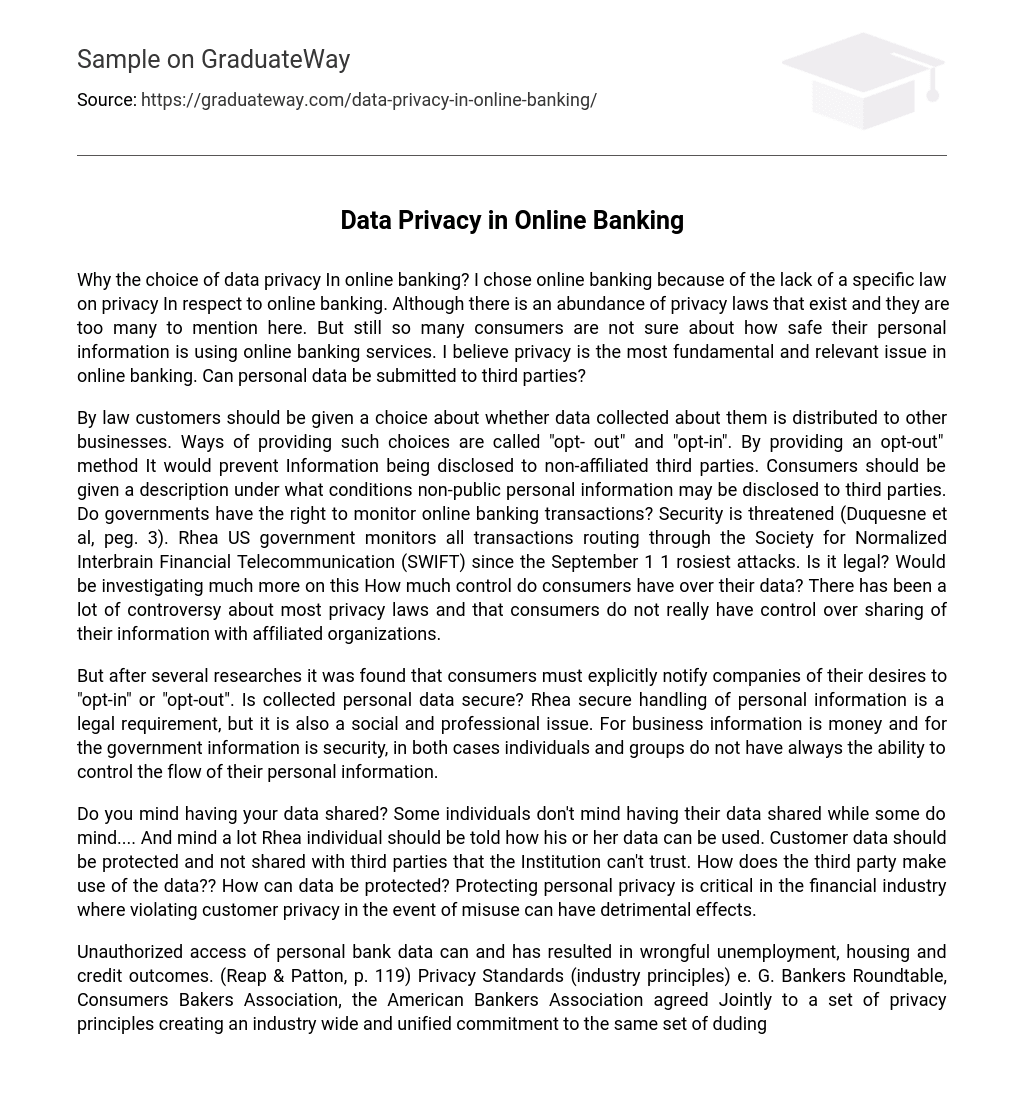Why the choice of data privacy In online banking? I chose online banking because of the lack of a specific law on privacy In respect to online banking. Although there is an abundance of privacy laws that exist and they are too many to mention here. But still so many consumers are not sure about how safe their personal information is using online banking services. I believe privacy is the most fundamental and relevant issue in online banking. Can personal data be submitted to third parties?
By law customers should be given a choice about whether data collected about them is distributed to other businesses. Ways of providing such choices are called “opt- out” and “opt-in”. By providing an opt-out” method It would prevent Information being disclosed to non-affiliated third parties. Consumers should be given a description under what conditions non-public personal information may be disclosed to third parties. Do governments have the right to monitor online banking transactions? Security is threatened (Duquesne et al, peg. 3). Rhea US government monitors all transactions routing through the Society for Normalized Interbrain Financial Telecommunication (SWIFT) since the September 1 1 rosiest attacks. Is it legal? Would be investigating much more on this How much control do consumers have over their data? There has been a lot of controversy about most privacy laws and that consumers do not really have control over sharing of their information with affiliated organizations.
But after several researches it was found that consumers must explicitly notify companies of their desires to “opt-in” or “opt-out”. Is collected personal data secure? Rhea secure handling of personal information is a legal requirement, but it is also a social and professional issue. For business information is money and for the government information is security, in both cases individuals and groups do not have always the ability to control the flow of their personal information.
Do you mind having your data shared? Some individuals don’t mind having their data shared while some do mind…. And mind a lot Rhea individual should be told how his or her data can be used. Customer data should be protected and not shared with third parties that the Institution can’t trust. How does the third party make use of the data?? How can data be protected? Protecting personal privacy is critical in the financial industry where violating customer privacy in the event of misuse can have detrimental effects.
Unauthorized access of personal bank data can and has resulted in wrongful unemployment, housing and credit outcomes. (Reap & Patton, p. 119) Privacy Standards (industry principles) e. G. Bankers Roundtable, Consumers Bakers Association, the American Bankers Association agreed Jointly to a set of privacy principles creating an industry wide and unified commitment to the same set of duding ideology (which are the noted by Reap & Patton) are: Recognize a customer’s expectation of privacy Use, collect, and retain customer information only if the institution believes the customer will benefit.
Maintain accurate information Protect information via established security procedures Restrict disclosure of account information Maintain customer privacy in business relationships with third parties Make an institutions privacy principles of policies known to the customer Some approaches across the globe as viewed by Seaworthy & Free (2006, p. 109) Privacy codes of practice: rules designed and governed by a group in how Information is collected and used e. G. BCC, ACM Technological solutions: Privacy – enhancing technologies allow consumers direct control of the information on their computer.
They include cookie manager, ad- blockers, encryption software, and clean-up tools. For example tools like zero knowledge systems pop-up & Ad Blocker System Consumer activism: A policy of taking direct action in online or offline environments to achieve desired enhancements in privacy policy (e. G. ) The American Civil liberties Union’s “Take Back Your Data Campaign”. Privacy concerns about the use of data: Collection – large amounts of personally identifiable data are collected and stored in databases. Unauthorized secondary use – personal data is used for purposes other than they were collected for primarily.
Improper access – personal information might be viewed by unauthorized personnel. Errors – how much protection is in place against errors (accidental or deliberate) in personal information data? Nat are the social, ethical, legal & professional issues of online banking? Unauthorized access of personal information or poor security measures in Information Systems put users (society) at risk and this could result in a loss of confidence by business and by the general public and could have a negative effect on the organization in today’s competitive world. It is also viewed as a social issue due to the effect on the society.
Ethical issues that surface in online banking business also give a cause for concern. Unauthorized use of someone’s personal computer without their permission or knowledge could be termed as an invasion of the individual’s privacy and shows a Gerard of the ethical principle which implies “respect for other people”. This could lead to hacking or installation of spare in the individual’s computer and puts the owner’s personal data at risk. In the banking industry, the Grammar-Leach-Bible Act of 1999 (GAL.) is a law passed to help enhance the protection of privacy. He Data Protection Act (1998) covers the right to privacy in the UK. The law is in place to protect digitally stored personal information from being widely distributed and mismanaged. Organizations are required by the act to make sure that personal information is kept secure. Due to the speed at which technology advances, many people use the internet for most of their personal needs (e-mails, internet calls, and video conferencing); nowadays more and more people make use of online banking on the internet.





